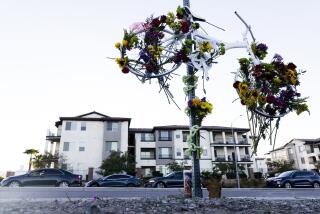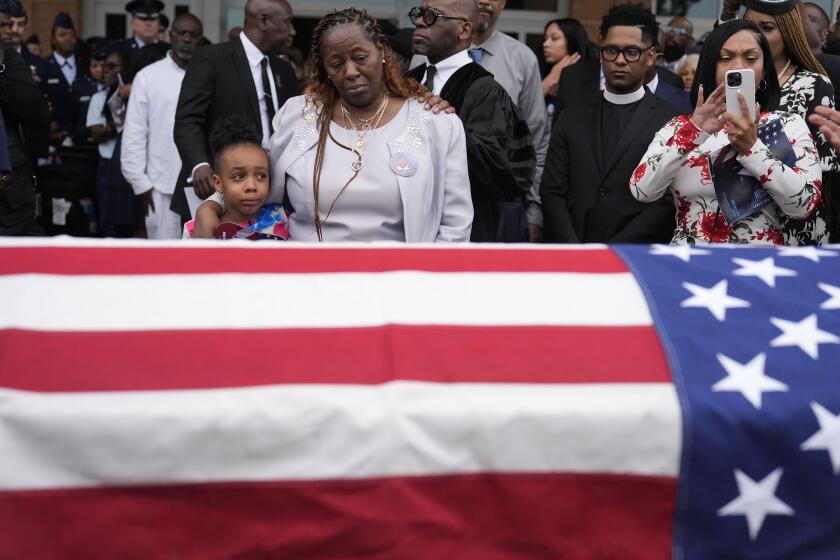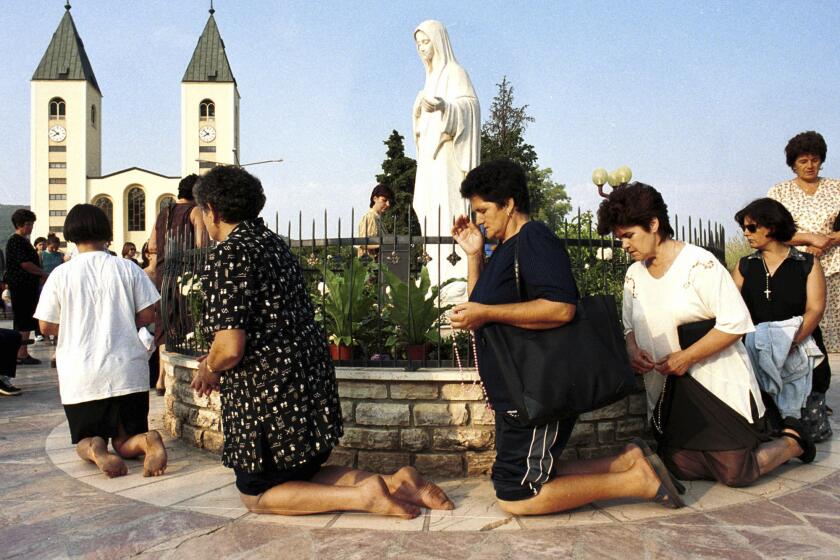NEWS ANALYSIS : Clinton Takes Policy Gamble With Syria Visit
President Clinton faces a serious foreign policy risk in his decision to visit Syria, a country linked with some of the deadliest acts of terrorism ever undertaken against the United States.
The White House has calculated that the visit will pay off in pushing forward the Middle East peace process. But the regime of President Hafez Assad is unlikely to reciprocate with the kind of dramatic concession needed to prove the risk was worth taking, senior U.S. officials acknowledge.
As a result, the Clinton Administration may come away looking like it is endorsing one of the Middle East’s most brutal regimes--and regretting the precedent of visiting a country officially listed as a sponsor of terrorism.
Damascus has eased its stance on negotiating with Israel, which has broached the possibility of giving up the strategically valuable Golan Heights in return for peace with its longtime enemy. But Syria remains a one-party state with a ruthless leader who slaughtered up to 25,000 of his own people during a 1982 uprising in Hama. Assad also allegedly supported the groups held responsible for the 1983-84 suicide bombings of two American embassies and U.S. Marine headquarters in Lebanon. The blasts killed more than 300 Americans.
Policy analysts say Clinton’s visit may leave the wrong impression. “A visit to a home capital is quite a huge concession. Presidents don’t go to other capitals to criticize. They go to endorse or show respect,” said Robert Satloff, director of the Washington Institute on Near-East Policy.
“But the merits of this trip need to be measured by the potential for gain as well as risk. And the gains could be considerable in achieving a clear change in Syrian behavior on issues such as terrorism or winning from Assad a clear statement of his vision of peace with Israel.”
But some interested parties were angered by the news. In a letter faxed to the White House, a woman whose 20-year-old daughter died at the hands of terrorists said she was outraged by Clinton’s decision.
“You may say that you are seeking peace, but you are in fact rewarding terrorism with such a meeting,” said Susan Cohen, whose daughter, Theodora, died in the 1988 terrorist bombing of Pan Am Flight 103 over Lockerbie, Scotland. Syria and Iran were initially believed to be linked to the bombing, but subsequent evidence led to the indictments of two Libyans.
“Assad has never renounced terrorism, and a half-dozen of the most notorious terrorist organizations in the world operate under his protection in Syria and Syrian-controlled Lebanon,” Cohen wrote.
Clinton acknowledged such concerns Friday, admitting that the issue of Syria’s relationship with terrorists had been the subject of much debate among advisers. Yet despite the risks, Administration officials and foreign policy experts on Saturday described the decision as sound.
The State Department’s annual “Patterns of Global Terrorism” lists Syria as one of seven nations that sponsor terrorism, a distinction it has held since the list was first published in 1979. The others are Libya, Iraq, Iran, North Korea, Cuba and Sudan.
Although it says there is no evidence that Syrian officials have been directly involved in planning or executing terrorist attacks since 1986, the State Department report says several radical terrorists maintain training camps or other facilities in Syria or Syrian-controlled Lebanon.
Among these groups are the notorious Abu Nidal group, Ahmed Jibril’s Popular Front for the Liberation of Palestine-General Command and Islamic Jihad--all of which are opposed to the Middle East peace process. Others include the Japanese Red Army and anti-Turkey Kurdish groups.
The report notes, however, that Syria has taken steps to restrain the international activities of some groups. In July, 1993, Damascus helped cool escalating tensions between Lebanon and Israel by inducing Hezbollah militants to end rocket attacks on the northern Galilee region.
On Friday, Lebanese militants fired five volleys of rockets into Israel. A State Department official said Saturday that the United States “tries not to draw conclusions from a single act. We look at a pattern of behavior.
“We expected that Syria would keep Hezbollah from making such attacks, but we don’t want to go overboard in interpreting one attack,” the official said. “Most of the incidents along the border this year have been small and isolated.”
Several Middle East specialists said Saturday that the best way to deal with Assad on terrorism issues is through direct engagement.
“History suggests that we do better when we talk to Assad and work with him rather than when we try to ignore him or let him stew,” said Richard Haass, a George Bush Administration Middle East strategist who is now with the Carnegie Endowment for International Peace.
The Bush Administration invested considerable time in communicating and meeting with Assad, with two major payoffs, Haass said. Assad joined the U.S.-led Persian Gulf War coalition, and he went to the 1991 conference in Madrid that inaugurated the current peace effort.
The strategy is a sharp contrast with that of 10 years ago, when the Ronald Reagan Administration tried to cut Assad out of diplomacy, and the Syrian leader turned around and helped sabotage a May, 1983, agreement--mediated by the United States--on Israel’s withdrawal from Lebanon.
“The fact that he’s on the terrorism list should not get in the way of trying to work with him on the peace process for two reasons,” Haass said. “First, foreign policy is about priorities. I would argue right now the priority is to bring peace to the region. Second, the best way to get Syria to cooperate on terrorism is to bring them more deeply into the peace process.”
Syria is still a long way from getting its name removed from the U.S. terrorism list--or reaping the resulting rewards.
U.S. law mandates that an Administration has to certify two things before a country can clear away its terrorism status, according to the State Department’s counterterrorism office.
First, the country must refrain from terrorism or support of terrorism for at least six months. That includes refusing to grant logistic, financial and political support and refusing haven, aid or comfort to terrorist organizations.
Second, the country has to give “credible assurances” that it will no longer engage in terrorism or support of terrorism. The White House then makes a determination when it is satisfied with the assurances and notifies Congress 45 days before the country is to be taken off the list. Once its name is removed, sanctions on arms sales are lifted.
Although Congress cannot stop a country from getting off the list, both houses can pass a joint “resolution of disapproval,” which would block any new arms transfers.
Syria is unlikely to be taken off the list before the new “Patterns of Global Terrorism” is published by the State Department in April.
More to Read
Start your day right
Sign up for Essential California for news, features and recommendations from the L.A. Times and beyond in your inbox six days a week.
You may occasionally receive promotional content from the Los Angeles Times.






